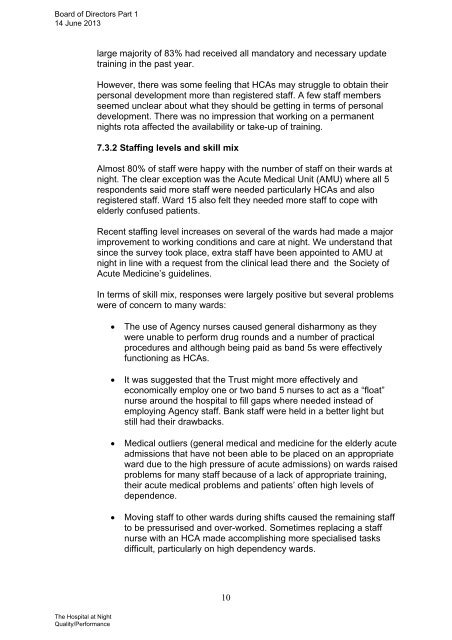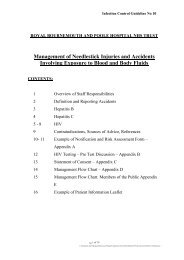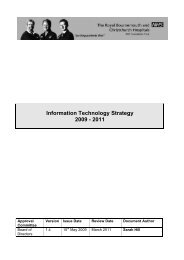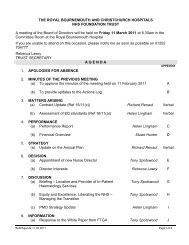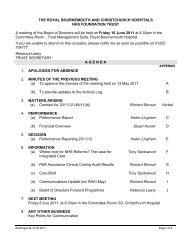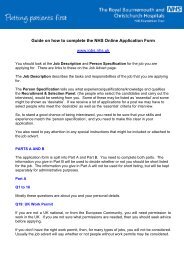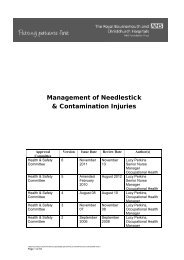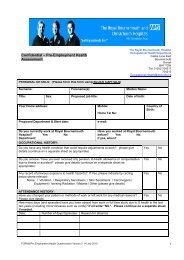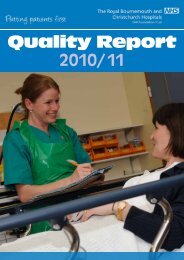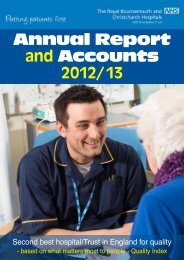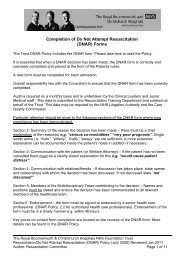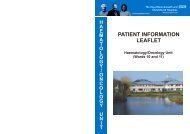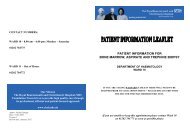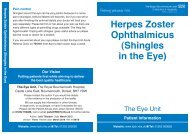A G E N D A 1. APOLOGIES FOR ABSENCE Ian Metcalfe 2 ...
A G E N D A 1. APOLOGIES FOR ABSENCE Ian Metcalfe 2 ...
A G E N D A 1. APOLOGIES FOR ABSENCE Ian Metcalfe 2 ...
Create successful ePaper yourself
Turn your PDF publications into a flip-book with our unique Google optimized e-Paper software.
Board of Directors Part 114 June 2013large majority of 83% had received all mandatory and necessary updatetraining in the past year.However, there was some feeling that HCAs may struggle to obtain theirpersonal development more than registered staff. A few staff membersseemed unclear about what they should be getting in terms of personaldevelopment. There was no impression that working on a permanentnights rota affected the availability or take-up of training.7.3.2 Staffing levels and skill mixAlmost 80% of staff were happy with the number of staff on their wards atnight. The clear exception was the Acute Medical Unit (AMU) where all 5respondents said more staff were needed particularly HCAs and alsoregistered staff. Ward 15 also felt they needed more staff to cope withelderly confused patients.Recent staffing level increases on several of the wards had made a majorimprovement to working conditions and care at night. We understand thatsince the survey took place, extra staff have been appointed to AMU atnight in line with a request from the clinical lead there and the Society ofAcute Medicine’s guidelines.In terms of skill mix, responses were largely positive but several problemswere of concern to many wards:The use of Agency nurses caused general disharmony as theywere unable to perform drug rounds and a number of practicalprocedures and although being paid as band 5s were effectivelyfunctioning as HCAs.It was suggested that the Trust might more effectively andeconomically employ one or two band 5 nurses to act as a “float”nurse around the hospital to fill gaps where needed instead ofemploying Agency staff. Bank staff were held in a better light butstill had their drawbacks.Medical outliers (general medical and medicine for the elderly acuteadmissions that have not been able to be placed on an appropriateward due to the high pressure of acute admissions) on wards raisedproblems for many staff because of a lack of appropriate training,their acute medical problems and patients’ often high levels ofdependence.Moving staff to other wards during shifts caused the remaining staffto be pressurised and over-worked. Sometimes replacing a staffnurse with an HCA made accomplishing more specialised tasksdifficult, particularly on high dependency wards.10The Hospital at NightQuality/Performance


